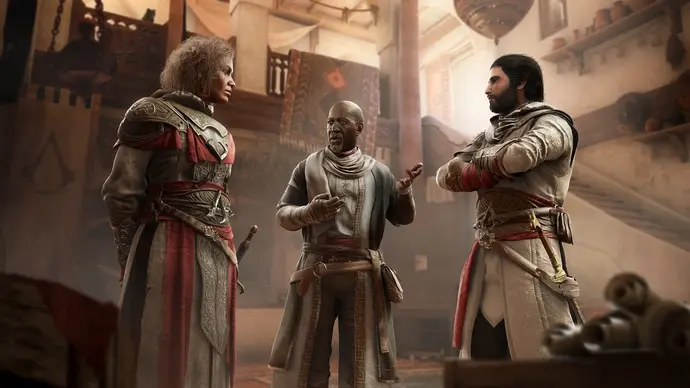Ubisoft Bordeaux takes the lead in developing a full-fledged game for the first time, despite being a relatively compact studio within the Ubisoft family. Their choice to helm the creation of Mirage, following their work on Valhalla’s Wrath of the Druids, appears apt. Originally conceived as DLC for Valhalla, Mirage has since evolved into a standalone adventure centered around the enigmatic Assassin character Basim Ibn Ishaq, all set within the franchise’s original backdrop.
The choice of Baghdad as Mirage’s setting aligns perfectly with the game’s mission to revisit the essence of the Assassin’s Creed series, paying homage to its inaugural release. Having had the opportunity to experience the game personally, it is evident that Bordeaux has succeeded in this endeavor.
The emphasis on stealth and reconnaissance rekindles the classic Assassin’s Creed gameplay experience, especially with the reintroduction of social blending. Moreover, the densely populated streets of Baghdad’s Round City and its adjacent towns bring parkour to the forefront once again, making it a primary means of navigating the environment, although the option for fast travel to previously synchronized viewpoints is also available for those seeking convenience.
The Round City itself is an impressive creation, distinct from the stereotypical desert city. It features canals, vast green spaces, and diverse districts with architecture reminiscent of the series’ origins. The Round City, enclosed by an immense circular wall with four distinct gates, offers entry into various outer districts such as Karkh, a bustling market town on the Silk Road, and Hariyah, an industrial district comprising fabric dyeing factories, brickworks, a prison, and the Grand Mosque. Additionally, there’s Abbasiyah, home to The House of Wisdom, a hub of scholarly pursuits in mathematics and philosophy.

Mirage also caters to fans of more recent open-world titles like Valhalla and Origins. The game begins with Basim as a humble thief working for the proto-Assassin Hidden Ones in the small town of Anbar, providing an ideal training ground for players to acclimatize to the game’s mechanics, replete with parkour opportunities and lively crowds.
The Wilderness, located between Anbar and The Round City, introduces wider, more open areas akin to Valhalla’s style. While these areas are not mandatory for exploration, they provide a refreshing change of pace. Mirage primarily offers a narrative-driven experience, distinguishing it from the expansive open-world approach of Valhalla.
Mirage also incorporates a visit to the fortress of Alamut, not featured on the main map. Located in Persia, this stronghold of the Hidden Ones is under construction during your visit and offers insights into their ways, including combat training, rock climbing, knife throwing, and Basim’s initial attempt at a Leap of Faith. Alamut is a treasure trove for Assassin’s Creed enthusiasts, packed with lore references and Easter Eggs.
In the latter part of my gameplay demo, I finally entered The Round City and witnessed the game’s full potential alongside a host of new and returning gameplay mechanics. Social blending makes a comeback, providing an effective means to elude pursuers and lower your notoriety level.
Mirage introduces a notoriety system, which leads to escalating reactions from NPCs if you engage in suspicious activities. For instance, failing a pickpocketing mini-game triggers NPCs to alert guards, setting off a chain reaction. Guards then actively search for you, while friendly NPCs grow more wary, especially if your notoriety is high. To evade capture, the game offers options such as bribing musicians to create distractions or, as a last resort, engaging in combat.
Mirage promises a compelling return to the core principles of the Assassin’s Creed franchise, offering a rich and immersive experience for both long-time fans and newcomers alike.
Assassin’s Creed Mirage marks a deliberate return to the franchise’s original essence, emphasizing stealth over combat. Engaging in combat feels like a last resort, particularly when confronting multiple adversaries, even though Basim showcases some impressive combat maneuvers.
One notable addition is the Assassin’s Focus, a new ability allowing you to mark and swiftly eliminate multiple targets—a perfect tool for discreetly clearing rooms without alerting reinforcements. These skills are part of Mirage’s three linear progression paths, which enable you to enhance your eagle companion Enkidu, upgrade your arsenal of tools like noise makers, smoke bombs, blow darts, and throwing knives, as well as refine your combat proficiency.
Upon reaching The Round City, it becomes evident that the core of Mirage’s gameplay centers around ‘Investigations,’ forming the backbone of the game’s narrative. The Investigation Board, accessible from the menu, resembles the classic detective cork boards, connecting individual clues and suspects with threads.
This board aids you in tracking objectives and uncovering clues that lead to Black Box missions—assignments featuring primary assassination targets that require tracking and elimination. In my hands-on experience, these investigations led me on a quest to recover stolen tea leaves for a trader named Kong, eventually guiding me to a stolen hairpin artifact. After navigating through a series of covert maneuvers and discreet eliminations, I learned that the hairpin was scheduled for auction at a bazaar later in the day. My subsequent mission involved gathering intelligence that would unveil the target’s location and identity.
I’ll avoid revealing spoilers, but the path to locating the target involved eavesdropping, bribery, basic platforming puzzles involving object manipulation and explosive tactics, and, of course, a fair share of stealthy assassinations. The gameplay in this section might be somewhat slower-paced, and despite the appearance of choice, it felt more linear than other parts of the game.
Nonetheless, I found it engaging and concluded with a satisfying outcome. In essence, I relished the experience of adopting a Batman-style approach to assassination in a more confined environment, a departure from the expansive open-world settings of recent Assassin’s Creed titles. Mirage successfully recaptures the nostalgic thrill of hunting targets from the rooftops, reminiscent of the original Assassin’s Creed game.










